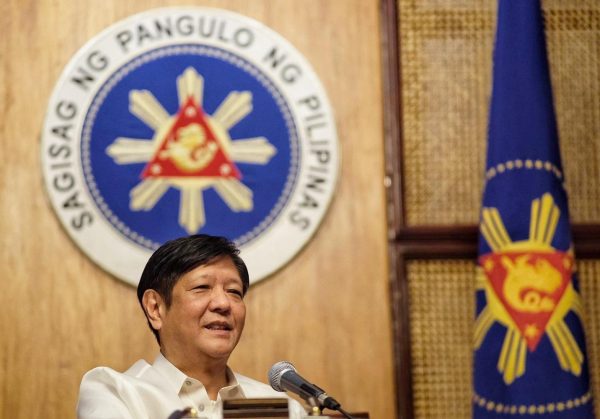
“You can say what you want, that’s your opinion. You’re wrong.”
This was Philippine President Ferdinand Marcos Jr.’s response to those who are calling him the son of a dictator. Marcos said this in a pre-recorded video interview with his goddaughter Toni Gonzaga, a TV actress who also hosted election rallies of Marcos during the campaign period. The interview was uploaded on YouTube on September 13 and aired on a new TV network owned by a political ally of the president.
It marks the first time that the president has agreed to a one-on-one interview after his proclamation in May. It is telling that the interview was not done by a member of the press, which reflects the president’s refusal to be questioned by journalists he deems biased against his family.
The interview was released a few days before the president’s important trip to the United States, where he’s scheduled to address the United Nations General Assembly, and a week before the 50th anniversary of his father’s declaration of Martial Law in 1972. Instead of a televised speech or a press forum, he chose to discuss the state of the nation and his thoughts on several controversial topics by sitting down for a vlog interview with his goddaughter.
Despite the well-documented abuses committed during the Martial Law years, the president insisted that it is not accurate to call his father, Ferdinand E. Marcos, a dictator because government policies and programs during that time were drafted only after consulting with various stakeholders. He even claimed that succeeding administrations consulted fewer people and groups.
Perhaps in anticipation of critical commentaries ahead of the protests that are set to accompany the Martial Law anniversary, Marcos emphasized that military rule was needed to save the republic from the threats of communism and Muslim secessionism.
“You can check facts. Let’s talk about facts, not political opinion,” he asserted. But he followed this up with a false narrative about how the communist rebels came close to gaining control of urban centers in 1972. What he didn’t mention was that the armed wing of the Communist Party was established only in 1969 and this rag-tag army was mostly based in remote provinces. It did gain strength and a nationwide following but only after Marcos became an authoritarian leader. He also conveniently forgot to add that his father’s term as president would have ended in 1973 if Martial Law had not been declared.
It is not just the history of Martial Law that the president wanted to revise, as he expressed intent to reopen the court case directing his family to pay an outstanding estate tax of 23 billion pesos ($403 million dollars) which has since gone up to 203 billion pesos ($3.5 billion dollars) because of penalties and surcharges. Marcos said the family was not given a chance to properly argue their case because they were forced to go into exile in Hawaii after his father’s ouster in 1986. This has already been fact-checked as false because the court proceedings took place in the 1990s when the Marcoses were already back in the country and President Marcos himself was an elected member of the House of Representatives.
Marcos said he intends to talk about economic recovery and food security at the U.N. this week. This is ironic since he has recently downplayed the role of international mechanisms to address urgent social issues. Asked about why the Philippines will not rejoin the International Criminal Court, which is investigating the drug-related killings committed under the previous Rodrigo Duterte government, Marcos said in his interview with Gonzaga that it was unnecessary.
“The alleged crimes were all committed in the Philippines. They were all committed by Filipinos. Why will we need a foreigner to tell us how to deal with it? I don’t think we do. I don’t think we need…I do not see why it’s a violation of human rights. It is a question of jurisdiction and sovereignty,” he said.
This kind of reasoning echoes the rhetoric of other notorious heads of state, who attack the U.N. and its experts for allegedly meddling in their domestic affairs.
Despite the misleading assertions, the interview with Marcos yielded crucial insight into some of his policy priorities. For example, he said the anti-drug campaign will continue but under a different approach focusing mainly on prevention and rehabilitation. He also cast doubt on the effectiveness of the death penalty as a deterrent. He vowed to focus on transforming the economy as he reiterated his campaign promise to bring down the cost of food items, especially rice, over the next three years.
Near the end of the interview, Marcos was asked about his dream for the country. His reply was “equality,” as he noted the wide gap between the rich and poor. May he ponder more on his response so that he can have a broader concept of equality that will make him understand that equal access does not just refer to economic goods but also to justice.
President Ferdinand Marcos Jr. Says His Father Was Not a Dictator
Source: Frappler

0 Comments